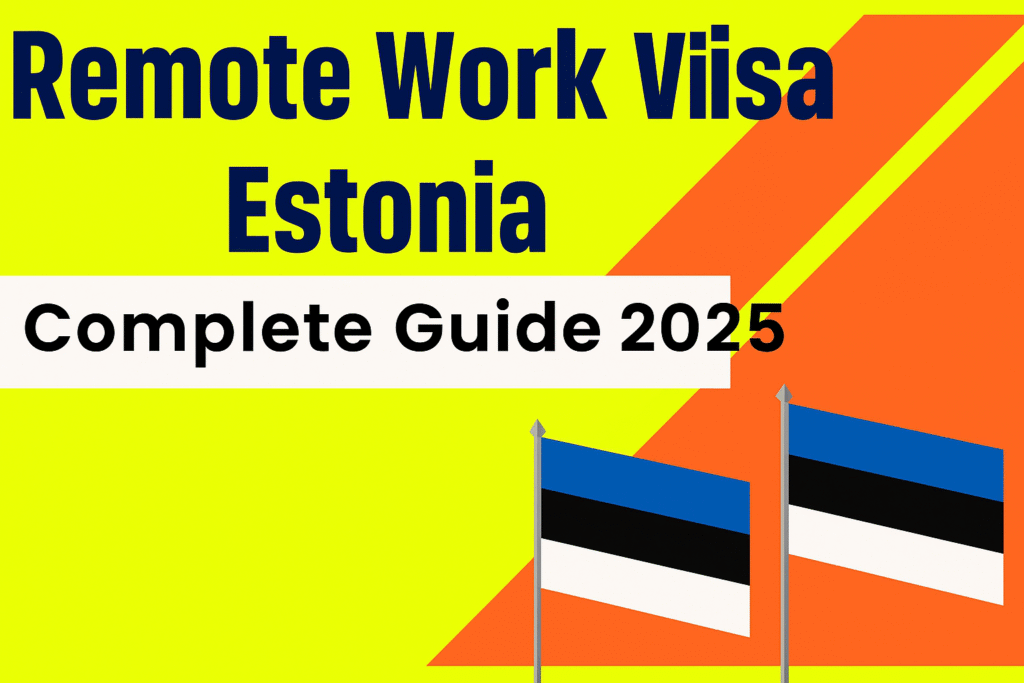Introduction
Remote work is no longer just a trend — it has become a lifestyle for millions worldwide. Countries are now introducing digital nomad visas to attract location-independent workers who bring income from abroad. One of the pioneers in this space is Estonia, a small Baltic nation famous for its e-governance, tech-savvy culture, and welcoming environment for freelancers.
In this guide, we’ll explore everything you need to know about Estonia’s Remote Work Visa in 2025 — from eligibility requirements and application steps to costs, benefits, and practical tips for living as a digital nomad in Estonia.
Why Estonia for Remote Work?
- E-Residency Program: Estonia is known for being the first country to offer e-residency, making it easy to manage businesses online.
- Tech Infrastructure: High-speed internet, digital services, and modern coworking hubs.
- European Location: Easy access to other EU and NATO countries.
- Safe & Affordable: Compared to Western Europe, Estonia offers lower living costs while maintaining a high quality of life.
What Is the Estonia Remote Work Visa?
The Estonia Remote Work Visa allows foreign nationals to live in Estonia for up to 12 months while working remotely for a foreign company or running their own business online.
It was introduced in August 2020 and continues to evolve in 2025 with improved guidelines.
Eligibility Requirements (2025 Update)
To qualify, applicants must:
- Work Remotely
- Be employed by a company registered outside Estonia, OR
- Be a freelancer with foreign clients, OR
- Own a business registered abroad.
- Be employed by a company registered outside Estonia, OR
- Income Requirement
- Applicants must earn at least €4,500 gross per month (2025 update).
- Income proof: last 6 months’ bank statements, contracts, payslips.
- Applicants must earn at least €4,500 gross per month (2025 update).
- Valid Travel Document
- Passport valid for at least 12 months.
- Passport valid for at least 12 months.
- Health Insurance
- Must cover you for the duration of your stay.
- Must cover you for the duration of your stay.
- Clean Criminal Record
- Background check may be required.
- Background check may be required.
Types of Estonia Remote Work Visa
- Short-Stay (C-Visa): Up to 90 days.
- Long-Stay (D-Visa): Up to 1 year, renewable.
Application Process Step by Step
Step 1: Gather Required Documents
- Valid passport
- Application form (online or at embassy)
- Proof of employment/freelance contracts
- Proof of income (€4,500+/month)
- Health insurance policy
- Proof of accommodation (hotel/lease contract)
Step 2: Submit Application
- Apply at an Estonian Embassy/Consulate OR
- Apply at Estonia Police and Border Guard Board.
Step 3: Pay the Fee
- C-Visa: €80
- D-Visa: €100
Step 4: Wait for Processing
- Usually 15–30 days.
Step 5: Collect Visa & Travel to Estonia
- Once approved, you can enter and begin your digital nomad journey.
Benefits of the Estonia Remote Work Visa
✅ Legal stay in Estonia while working remotely.
✅ Access to Schengen Area (26 countries).
✅ Opportunity to experience Estonia’s culture and nature.
✅ Lower taxes if you register business with e-Residency.
✅ Gateway to EU digital economy.
Cost of Living in Estonia (2025)
- Accommodation: €400–700/month (1-bedroom in Tallinn).
- Food: €250–400/month.
- Coworking: €100–150/month.
- Transport: €30–50/month.
👉 Total: €1,000–1,400/month (comfortable digital nomad lifestyle).
Best Cities for Digital Nomads in Estonia
- Tallinn – Capital, tech hub, best coworking spaces.
- Tartu – University town, affordable, vibrant culture.
- Pärnu – Seaside town, great for summer remote work.
Internet & Coworking Spaces
- Average Internet Speed: 100 Mbps+
- Popular Coworking Spaces:
- Lift99 Tallinn
- Spring Hub
- OBJEKT (Tartu)
- Lift99 Tallinn
Taxation for Remote Workers
- If you stay less than 183 days, you’re not considered a tax resident.
- If you stay longer, you may need to pay Estonian income tax (20%).
- Many nomads use the E-Residency business structure to optimize taxes.
FAQs About Estonia’s Remote Work Visa
1. Can I bring my family with me?
Yes, dependents can apply for visas too. Proof of income must cover family expenses.
2. Can I switch jobs?
Yes, as long as you maintain the income requirement and work for non-Estonian employers.
3. Is the visa renewable?
Yes, you can reapply for another 12 months after expiry.
4. Can I travel in the EU with this visa?
Yes, you can visit Schengen countries for up to 90 days in any 180-day period.
Conclusion
Estonia remains a top destination for digital nomads in 2025 thanks to its forward-thinking government, e-Residency, and strong tech infrastructure. The Remote Work Visa makes it easy for freelancers, entrepreneurs, and employees of foreign companies to live legally in Estonia while enjoying the benefits of the European Union.If you’re planning your next remote work base, Estonia should definitely be on your list
